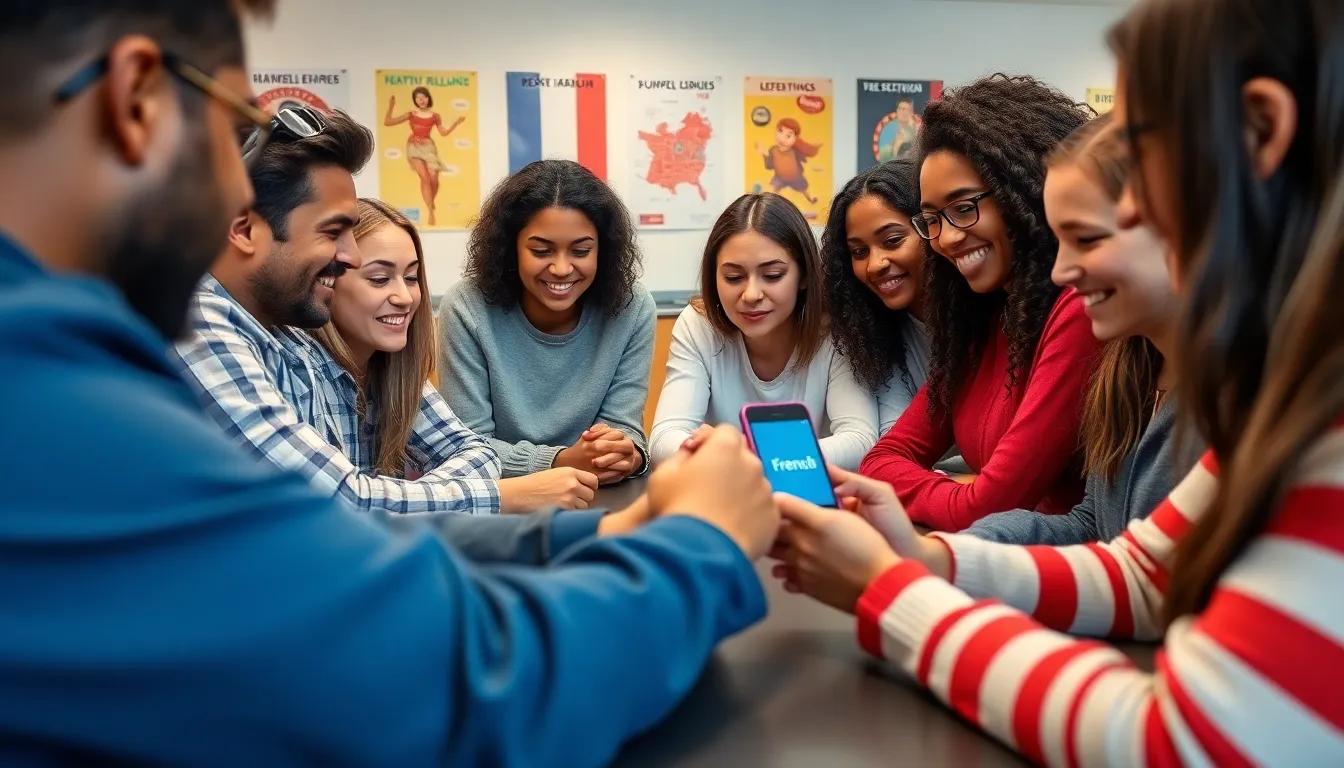Imagine sipping a café au lait in a charming Parisian café while effortlessly chatting with the locals. Sounds dreamy, right? With the right French language learning app, that fantasy can become a reality. In today’s fast-paced world, learning a new language doesn’t have to mean endless textbooks and boring lectures. Instead, it can be as fun as binge-watching your favorite series—just with a little more “Bonjour” and a lot less popcorn.
Table of Contents
ToggleOverview of French Language Learning Apps
French language learning apps provide users with engaging platforms to enhance their skills. These applications range from beginner to advanced levels, catering to various learning preferences. Popular choices include Duolingo, Babbel, and Rosetta Stone, each offering unique features tailored to different learners.
Duolingo uses gamification to make learning enjoyable, incorporating quizzes and challenges that motivate users. Babbel focuses on conversation skills, presenting real-life dialogue examples to facilitate practical communication. Rosetta Stone immerses learners in the language, ensuring comprehension through context rather than translation.
Features across these apps often include speech recognition, interactive lessons, and vocabulary drills. Speech recognition helps users practice pronunciation, providing immediate feedback for improvement. Interactive lessons cover essential grammar points while allowing flexibility in learning pace. Vocabulary drills reinforce memory retention with repetition techniques.
Pricing models vary significantly among these applications. Some offer free basic versions with optional premium upgrades for additional content, while others provide subscription plans with comprehensive access. Users should consider their budget and learning goals when choosing an app.
Community support enhances engagement within these platforms. Many apps feature forums or social components where learners can connect, ask questions, and share experiences. This collaborative aspect fosters motivation, as users often encourage one another in their language journeys.
In essence, French language learning apps serve as powerful tools to facilitate language acquisition. These platforms combine technology with interactive methods to transform the learning experience into an enjoyable adventure.
Key Features to Look For

When choosing a French language learning app, certain features enhance the overall experience and effectiveness. Users should evaluate several key aspects to ensure they select the best option for their needs.
User-Friendly Interface
Apps with intuitive designs facilitate easier navigation. Easy access to lessons and clear layouts encourage consistent use. The presence of visually engaging elements helps maintain interest. Simplicity in design also allows learners to focus on content without distractions. Consider an app that minimizes the learning curve, so users can dive right into studying.
Comprehensive Course Content
An extensive curriculum covering various skill levels is crucial. Lesson plans must include grammar, vocabulary, and conversational practice. It’s beneficial to find an app that integrates cultural context within lessons, providing depth. Quality apps often adjust difficulty based on user proficiency, allowing for growth. Engaging exercises and real-life scenarios contribute to a well-rounded learning experience.
Progress Tracking and Analytics
Tracking progress keeps learners motivated and informed. Good apps provide users with individual performance metrics and analytics. Insights like daily practice streaks and skill improvement highlight areas needing attention. Users benefit from visual representations of advancement, reinforcing their commitment. Features that enable goal-setting further enhance accountability and progression in language acquisition.
Popular French Language Learning Apps
Many options exist for learning French through engaging apps. Each offers unique features catering to various learning styles.
Duolingo
Duolingo stands out for its gamified approach to language learning. Users earn points through quizzes and challenges, making the process enjoyable. The app provides bite-sized lessons that promote daily practice. Features include speech recognition for pronunciation and interactive exercises for vocabulary building. With a free version available, it appeals to learners on a budget. The platform’s community aspect encourages users to connect and support each other in their language journey.
Babbel
Babbel focuses on conversation skills with real-life dialogue examples. It offers a structured curriculum that progressionally advances learners through levels. Users benefit from grammar explanations and vocabulary tailored to essential situations. The app emphasizes cultural context, enriching the learning experience. Subscription pricing provides access to all lesson content. Babbel’s user-friendly interface and progress tracking maintain motivation and keep learners engaged.
Rosetta Stone
Rosetta Stone immerses learners in the French language through contextual understanding. The app utilizes a total immersion method, which creates a natural learning environment. Interactive lessons target vocabulary, grammar, and pronunciation simultaneously. It features live tutoring sessions for personalized feedback. Subscription plans offer flexibility, appealing to a wide range of users. Rosetta Stone’s focus on cultural immersion enhances learners’ connection to the language, ensuring a richer experience.
Effectiveness of French Language Learning Apps
French language learning apps significantly enhance the language acquisition process through interactive and personalized experiences.
User Experience and Feedback
Accessing user feedback highlights the effectiveness of these apps. Many learners appreciate the gamified elements in applications like Duolingo, fostering motivation and engagement. Positive reviews often mention the user-friendly interfaces that simplify navigation. Learners find community support invaluable, as it encourages interaction and knowledge sharing. Babbel users frequently report improved conversation skills, underlining the app’s focus on practical dialogue. Overall, feedback consistently emphasizes enjoyment in learning and the ability to practice at one’s own pace.
Comparison with Traditional Learning Methods
French language learning apps compare favorably against traditional methods. While conventional classes rely on rote memorization and passive learning approaches, apps incorporate interactive elements that promote active participation. These platforms allow learners to practice pronunciation using speech recognition technology, an advantage over typical classroom settings. Moreover, mobility provides the convenience of learning anytime and anywhere, adapting to busy lifestyles. Therefore, learners often report faster progress when utilizing these apps, as they cater to individual learning styles and preferences. The blend of entertainment and education underscores the effectiveness of digital tools in language acquisition.
French language learning apps offer a fresh and enjoyable approach to mastering the language. By combining entertainment with education these platforms transform the learning experience into an engaging adventure. Users can explore various features tailored to their individual needs whether it’s gamification for motivation or structured lessons for conversation skills.
The flexibility of learning anytime and anywhere makes these apps particularly appealing for busy individuals. With community support and progress tracking learners can stay motivated and connected. As more people embrace these modern tools it’s clear that language learning can be both effective and fun. Embracing these apps could be the key to unlocking fluency in French while enjoying the journey along the way.





